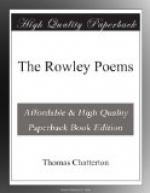Saie, Canynge, whatt was vearse
yn daies of yore?
Fyne thoughtes, and couplettes
fetyvelie[54] bewryen[55],
Notte syke as doe annoie thys
age so sore,
A keppened poyntelle[56] restynge
at eche lyne.
Vearse maie be goode, botte
poesie wantes more, 45
An onlist[57] lecturn[58],
and a songe adygne[59];
Accordynge to the rule I have
thys wroughte,
Gyff ytt please Canynge, I
care notte a groate.
The thynge yttself moste bee
ytts owne defense;
Som metre maie notte please
a womannes ear. 50
Canynge lookes notte for poesie,
botte sense;
And dygne, & wordie thoughtes,
ys all hys care.
Canynge, adieu! I do
you greete from hence;
Full soone I hope to taste
of your good cheere;
Goode Byshoppe Carpynter dyd
byd mee saie, 55
Hee wysche you healthe & selinesse
for aie.
T. ROWLEIE.
[Footnote 35: nought.]
[Footnote 36: they.]
[Footnote 37: esteem.]
[Footnote 38: heraldry.]
[Footnote 39: such.]
[Footnote 40: unwilling.]
[Footnote 41: much.]
[Footnote 42: wisdom, council.]
[Footnote 43: if.]
[Footnote 44: perchance.]
[Footnote 45: them.]
[Footnote 46: Greybeards.]
[Footnote 47: curiously.]
[Footnote 48: lessened.]
[Footnote 49: small.]
[Footnote 50: that.]
[Footnote 51: allow.]
[Footnote 52: cart-horse.]
[Editor’s note: ll. 15-16 See Introduction p. xli]
[Footnote 53: broken.]
[Footnote 54: elegantly.]
[Footnote 55: declared, expressed.]
[Footnote 56: a pen, used metaphorically, as a muse or genius.]
[Footnote 57: boundless.]
[Footnote 58: subject.]
[Footnote 59: nervous, worthy of praise.]
ENTRODUCTIONNE.
Somme cherisounce[60] it ys
to gentle mynde,
Whan heie have chevyced[61]
theyre londe from bayne[62],
Whan theie ar dedd, theie
leave yer name behynde,
And theyre goode deedes doe
on the earthe remayne;
Downe yn the grave wee ynhyme[63]
everych steyne, 5
Whylest al her gentlenesse
ys made to sheene,
Lyche fetyve baubels[64] geasonne[65]
to be seene.
AELLA, the wardenne of thys[66]
castell[67] stede,
Whylest Saxons dyd the Englysche
sceptre swaie,
Who made whole troopes of
Dacyan men to blede, 10
Then seel’d[68] hys
eyne, and seeled hys eyne for aie,
Wee rowze hym uppe before
the judgment daie,
To saie what he, as clergyond[69],
can kenne,
And howe hee sojourned in
the vale of men.




